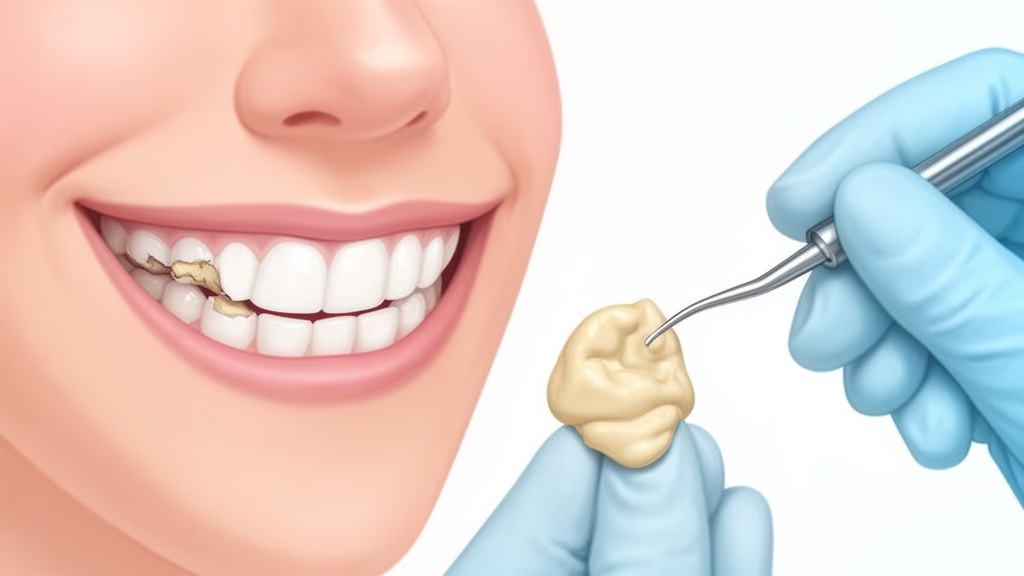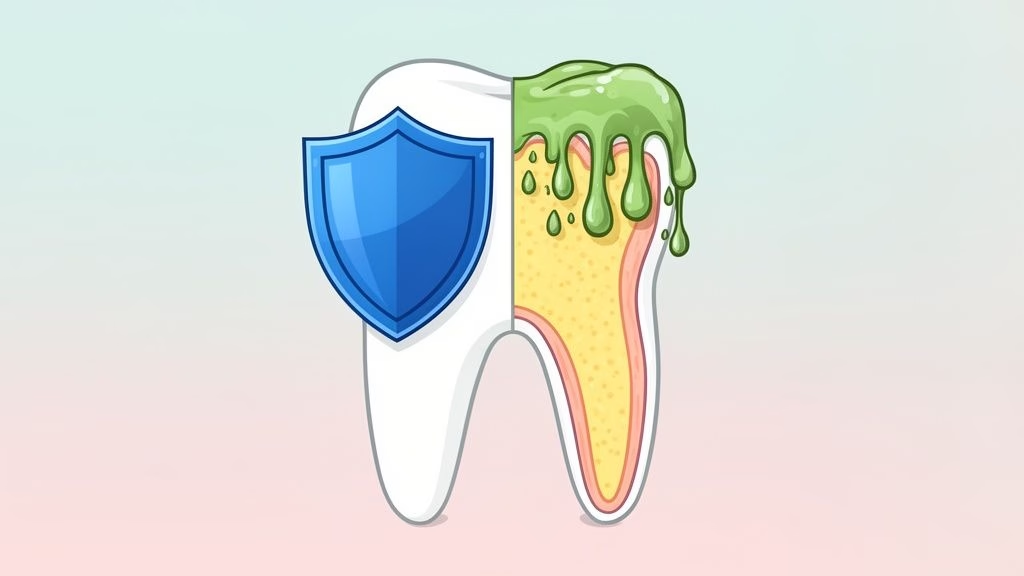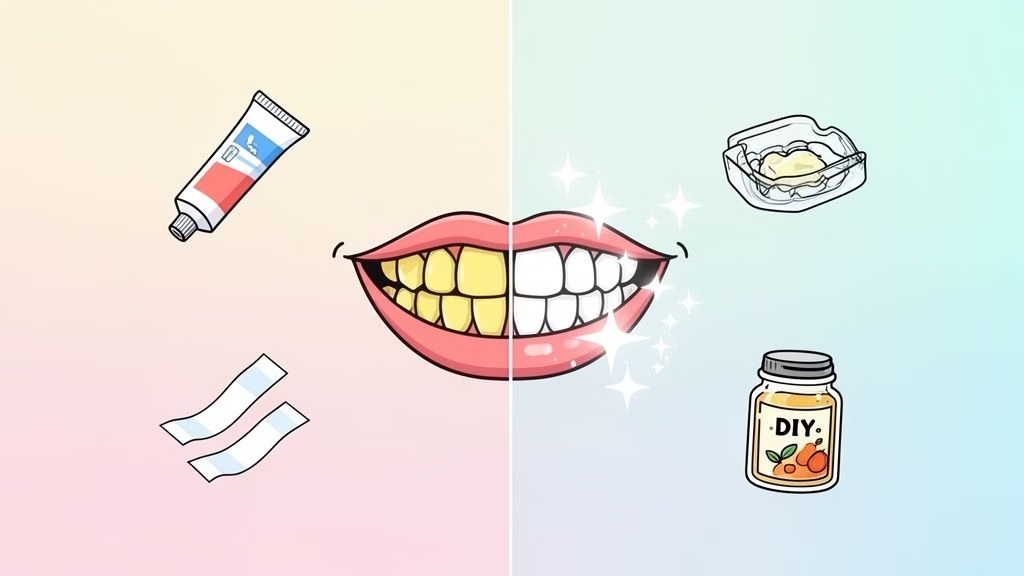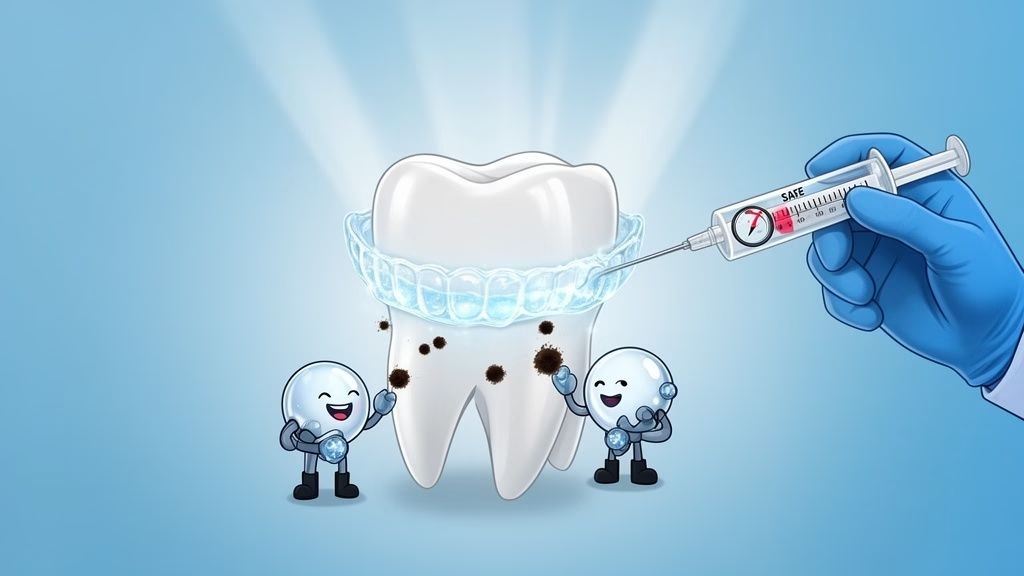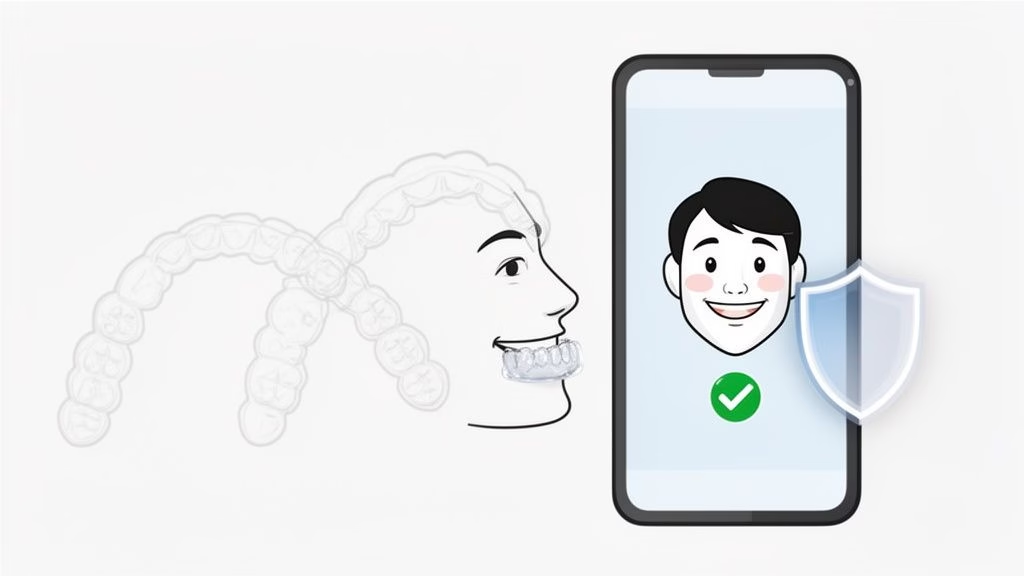Your Guide on How to Treat Dry Mouth
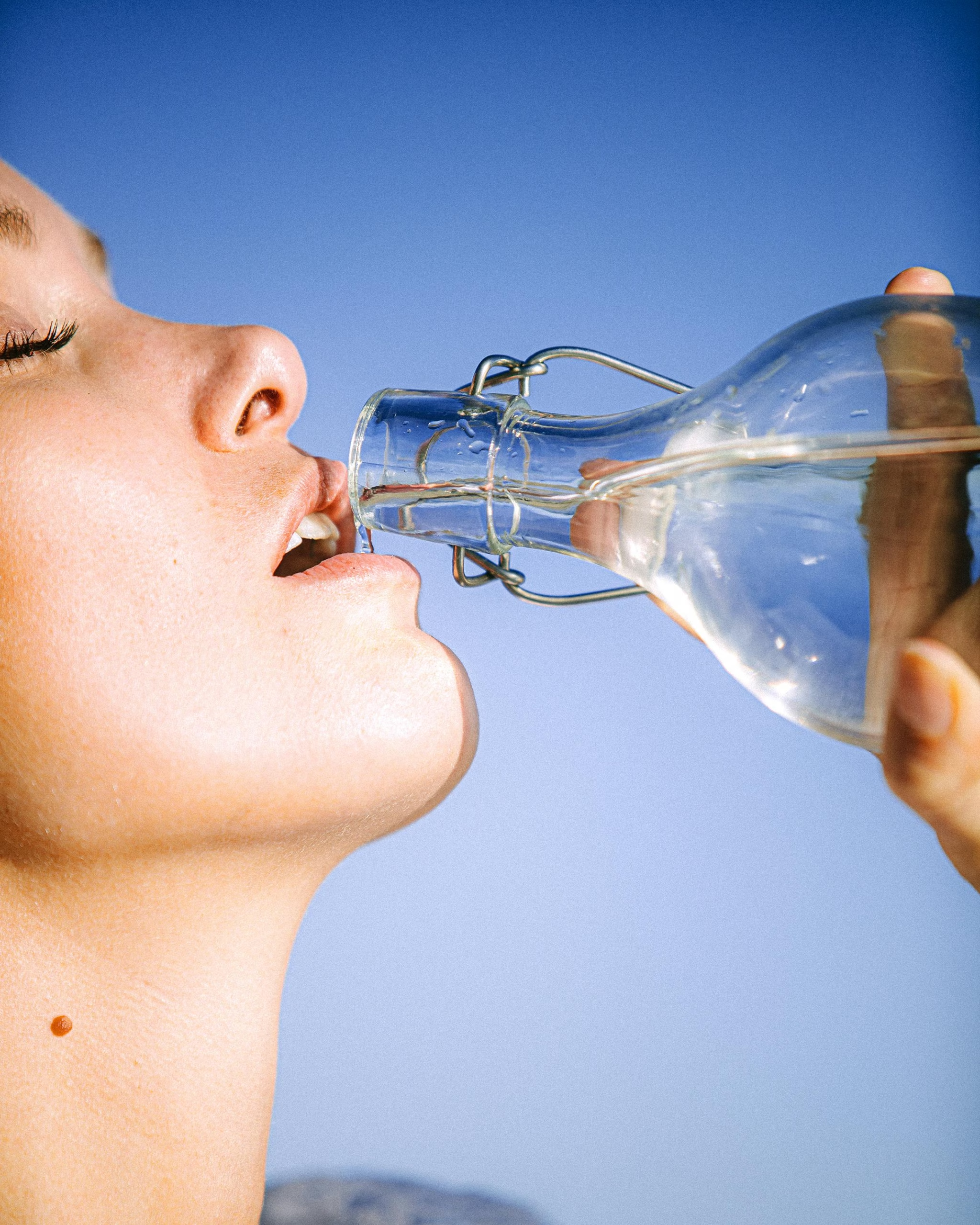
Dealing with dry mouth usually starts with figuring out why it’s happening in the first place. Simple things like upping your water intake, chewing sugar-free gum to get your saliva going, and cutting back on dehydrating drinks like coffee and alcohol are a fantastic starting point. But sometimes, the problem runs a bit deeper.
Why Is My Mouth Always So Dry?
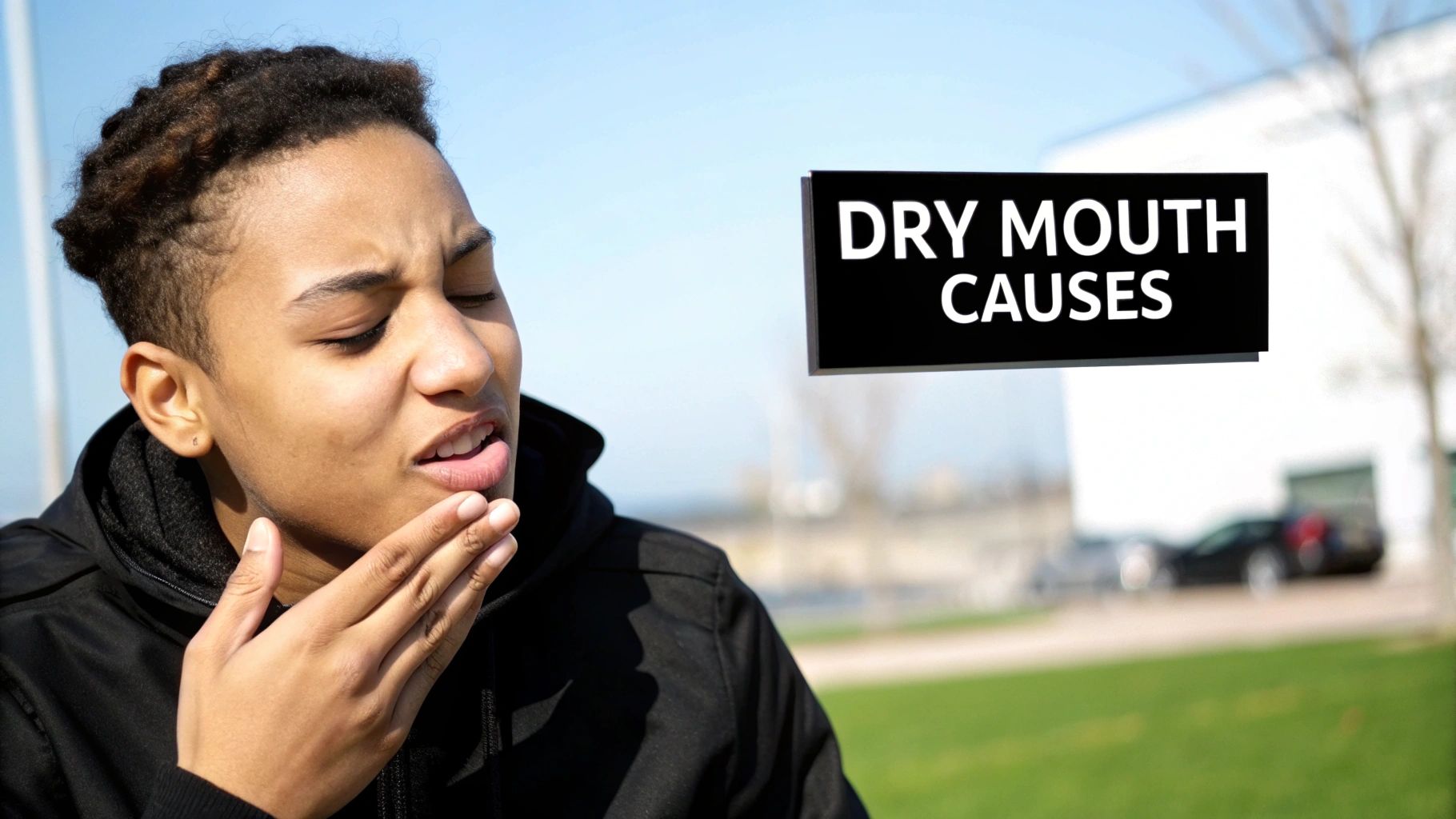
It’s a frustrating and persistent feeling, isn’t it? That constant, cottony sensation that even endless sips of water can’t seem to shift. Clinically, this is known as xerostomia, and it’s more than just a minor inconvenience. It’s a clear sign that something is disrupting your saliva production.
Your saliva is your mouth’s unsung hero. It keeps everything lubricated, helps you digest food, and, crucially, protects your teeth from decay. When this natural defence is down, you’re not just left with discomfort—you’re opened up to a whole host of oral health problems.
While it’s easy to blame simple dehydration, the real culprits are often more complex and tied into your daily habits, medications, and overall health.
The Usual Suspects Behind Xerostomia
To find lasting relief, you first need to play detective and pinpoint what’s triggering your dry mouth. The cause isn’t always obvious and can range from the medicine in your cabinet to the air in your bedroom.
Here are a few of the most common drivers I see in my practice:
- Medications: Hundreds of common UK prescriptions—for things like depression, anxiety, allergies (antihistamines), and high blood pressure—list dry mouth as a top side effect.
- Lifestyle Habits: Those daily choices really add up. Smoking, regular alcohol consumption, and even that morning coffee habit can all significantly reduce your saliva flow.
- Mouth Breathing: Whether it’s from a stuffy nose or just a habit (especially at night), breathing through your mouth causes saliva to evaporate in no time.
Beyond these, certain health conditions are directly linked to xerostomia. Autoimmune diseases like Sjögren’s syndrome, for instance, actually attack the body’s moisture-producing glands, including your salivary glands. Other conditions like diabetes or nerve damage in the head and neck can also interfere with saliva production.
The key takeaway here is that a persistent dry mouth isn’t just about thirst. It’s a symptom that needs attention to prevent bigger problems down the line, like tooth decay and gum disease.
To help you connect the dots, this table outlines some common causes and the signs they often come with.
Common Dry Mouth Causes and What to Look For
| Cause Category | Specific Examples | Associated Signs |
|---|---|---|
| Medications | Antidepressants, antihistamines, blood pressure meds | Dryness starts or worsens after beginning a new prescription. |
| Lifestyle | Smoking, alcohol, high caffeine intake, diet | Persistent bad breath, stained teeth, a sticky feeling in the mouth. |
| Mouth Breathing | Due to allergies, sinus issues, or habit | Waking up with a very dry mouth, sore throat, chapped lips. |
| Health Conditions | Sjögren’s syndrome, diabetes, nerve damage | Dry eyes, joint pain, frequent thirst, tingling in the mouth. |
Take a moment to see if any of these patterns sound familiar. Identifying a likely cause is the most important step towards finding an effective solution.
Deeper Contributing Factors
Sometimes, the cause is less about what’s happening inside your body and more about your environment. For example, the air in your home can have a surprisingly big impact. Dry indoor air, especially during winter when the heating is on, can easily worsen a dry mouth. Learning about controlling humidity in your home can be a simple but effective part of your strategy.
Interestingly, UK data also reveals a link between social conditions and oral health. According to the Adult Oral Health Survey 2021, 15% of adults in the most deprived areas of the country reported having a dry mouth constantly or frequently. That’s nearly double the 8% reported in the least deprived areas. This really highlights how wider factors, like access to healthcare, can play a significant role.
Pinpointing your specific trigger is the key to finding a solution that works for you.
8 Simple Remedies for Immediate Dry Mouth Relief
When your mouth feels uncomfortably dry, you need relief, and you need it now. I’m not just talking about the obvious advice to “drink more water.” While good hydration is the foundation, tackling that sticky, desert-like feeling often requires a few more clever tricks to get your own saliva flowing again.
Think of these as your go-to first-aid measures. They’re simple things you can do right away, using items you might already have in your kitchen or can easily find at a local pharmacy. They’ll bring you some much-needed comfort while you work on figuring out the root cause.
Kickstart Your Saliva Flow
The best long-term solution is to get your own salivary glands back on the job. The good news is, you can give them a nudge. They respond really well to the simple act of chewing and to certain tart or strong flavours.
Here are a few tricks I often recommend to patients:
- Chew sugar-free gum with xylitol. The physical motion of chewing is a fantastic signal to your glands to produce more saliva. If you choose a gum containing xylitol, you get a double benefit – it helps stimulate saliva without feeding the bacteria that cause tooth decay.
- Suck on sugar-free sweets. Much like with gum, this encourages a steady flow of saliva. I find that sharp flavours like citrus, mint, or berry work particularly well. Just make absolutely sure they are sugar-free; the last thing you want is to bathe your teeth in sugar.
- Try something tart. A small slice of lemon, a lime wedge in your water, or even a sugar-free pickled gherkin can give your saliva production a powerful, immediate kickstart. It’s a short-term fix, but very effective.
For a quick summary of simple, comforting remedies you can try at home, the image below has some great ideas.
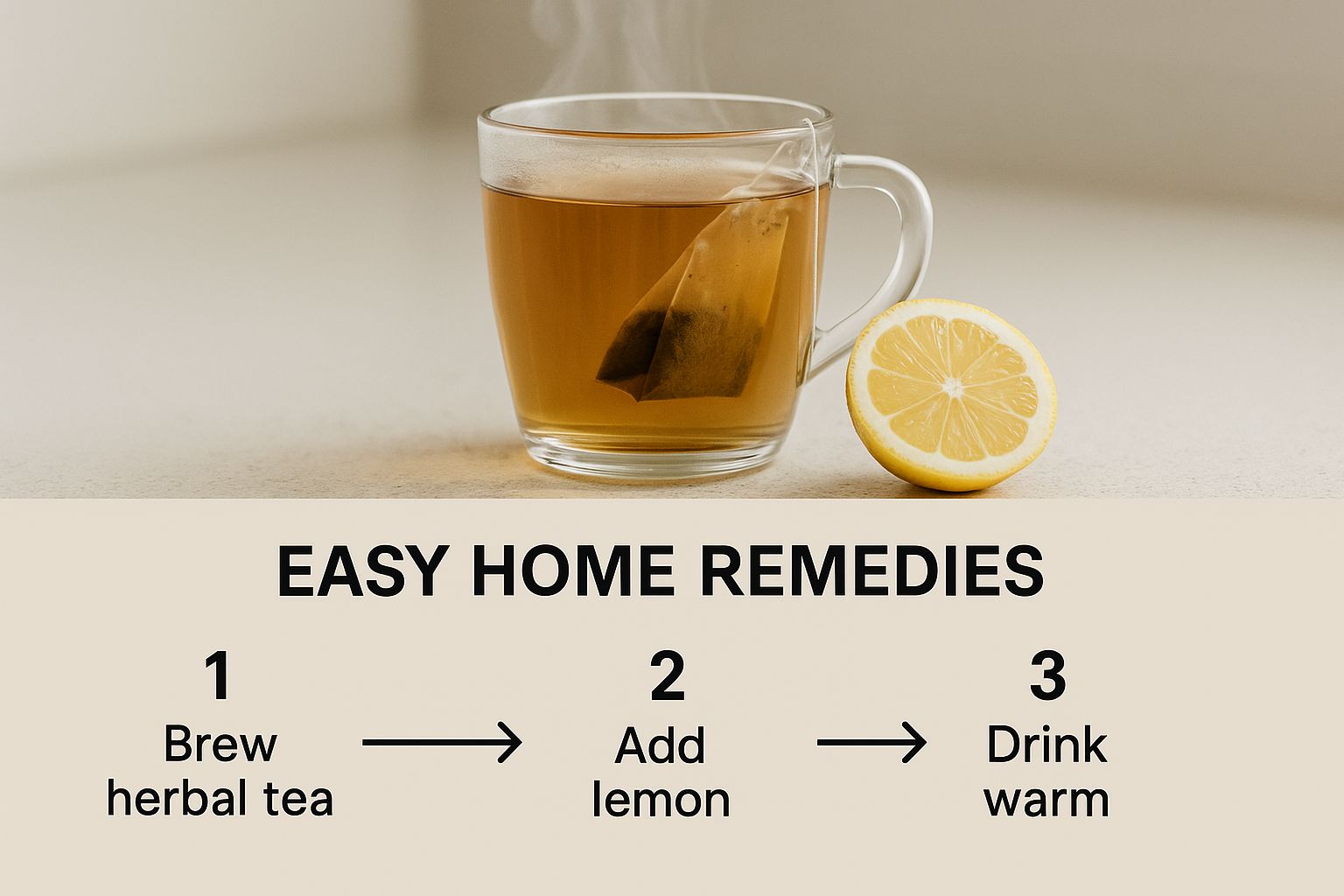
As you can see, everyday things like herbal tea and a bit of lemon can make a real difference in your daily comfort.
Smart Hydration and Pharmacy Aids
It sounds counterintuitive, but just chugging pints of water isn’t always the answer. Sometimes, drinking a large amount all at once can actually wash away the natural lubricating proteins in your saliva, leaving your mouth feeling even drier just a short while later.
My advice? Switch to taking small, frequent sips of water throughout the day. This keeps your mouth consistently moist without flushing away the good stuff. Many people also find cool or room-temperature water more soothing than ice-cold.
When sipping water alone isn’t cutting it, it’s time to look at what your local pharmacy has to offer. There are some excellent products out there designed specifically for dry mouth relief, and they can be a real game-changer, especially at night.
- Moisturising Gels and Sprays: These products work by coating the inside of your mouth with a lubricating film that mimics your own saliva. From my experience, gels tend to be thicker and last longer, making them brilliant for applying just before you go to sleep.
- Specialised Mouthwashes: Be sure to choose an alcohol-free formula. Alcohol is incredibly drying and will only make the problem worse. Look for mouthwashes with ingredients like xylitol or carboxymethylcellulose, which add moisture without causing irritation.
- Pastilles and Lozenges: You can find specialised lozenges that do two jobs at once: they stimulate your own saliva while also coating your mouth for extra comfort.
Finding what works best for you might take a bit of trial and error. Some people prefer a quick spritz from a spray during the day, while others swear by a long-lasting gel at night. Don’t be afraid to experiment to find your perfect combination for lasting relief.
Making Lifestyle Changes to Combat Dry Mouth
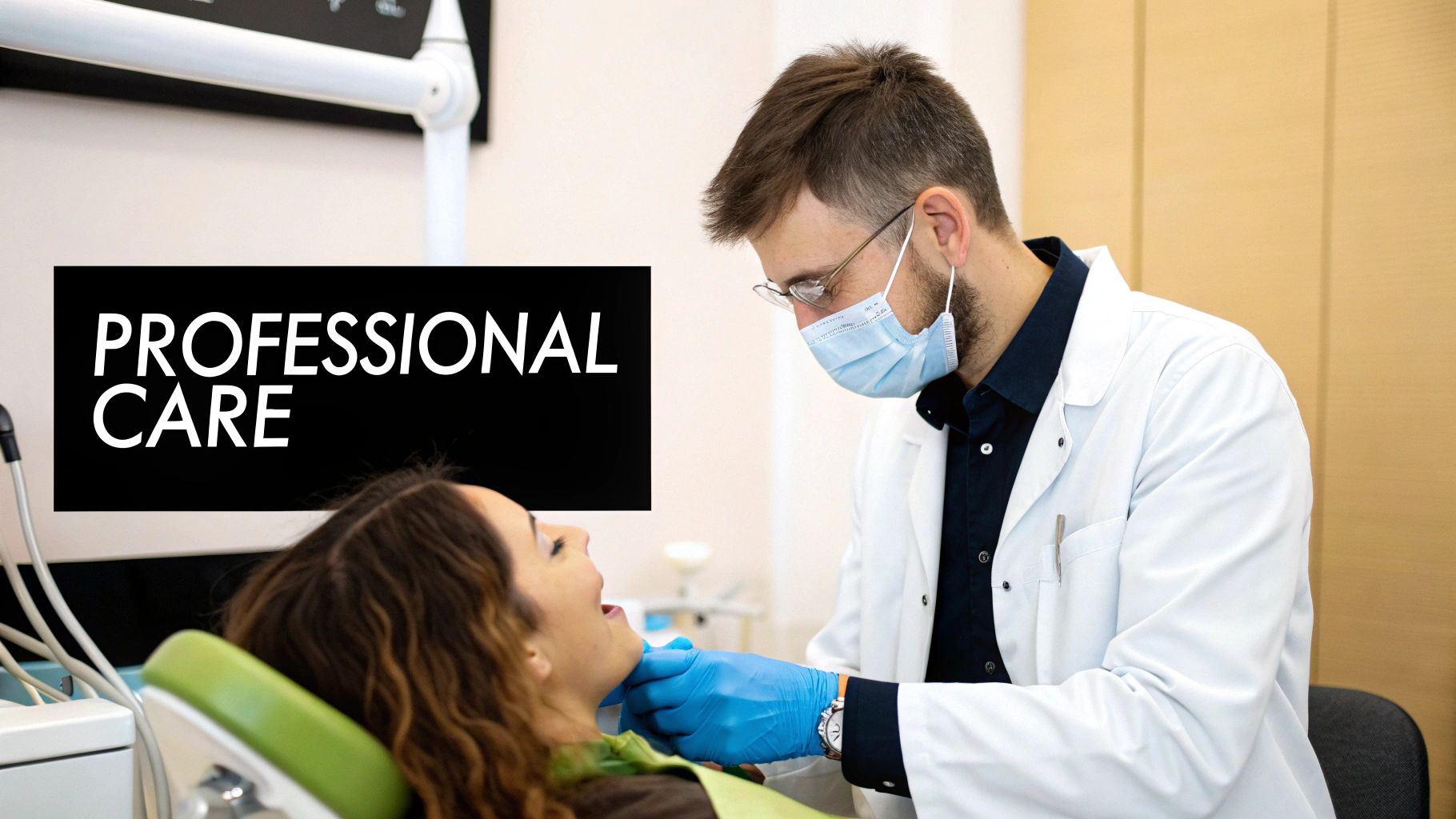
While gels and sprays give you some much-needed immediate comfort, the real key to managing dry mouth long-term lies in the small, smart habits you build into your everyday life. It’s less about a complete overhaul and more about making consistent, small adjustments that add up.
Think of it as creating a lifestyle that supports your body’s natural moisture balance instead of fighting against it. By understanding what triggers your dry mouth, you can start making powerful tweaks to your diet, your environment, and even your daily habits. This is where you’ll find lasting relief.
Rethinking Your Plate and Your Glass
What you eat and drink has a direct, almost instant, impact on how moist your mouth feels. Some things are notorious for making xerostomia worse, while others can be incredibly hydrating and soothing.
The main offenders are usually things that dehydrate your whole body. I’m talking about alcohol and caffeine – two of the biggest culprits. They directly reduce saliva flow, leaving you with that classic parched feeling. The same goes for overly salty or sugary foods, which can pull moisture right out of your tissues and make your mouth feel sticky.
The core idea for a dry-mouth-friendly diet is simple: choose foods rich in moisture. Opt for things that are naturally juicy and, importantly, require a good amount of chewing. The physical act of chewing is fantastic for kick-starting your salivary glands.
Here are a few easy swaps to get you started:
- Ditch the dry crackers and crisps. Instead, reach for snacks like crisp cucumber slices, celery sticks, juicy melon, or a handful of berries.
- Swap out sugary sweets and acidic drinks. Try chewing some sugar-free gum to get saliva flowing or sip on water infused with a slice of lemon or mint.
- Re-evaluating that third cup of coffee? A warm, caffeine-free herbal tea can be just as comforting without the dehydrating side effects.
Adjusting Your Home and Your Habits
It might surprise you, but your immediate environment and even habits you don’t notice can play a huge role in managing dry mouth. This is especially true at night when our saliva production naturally slows down.
One of the best changes you can make is to combat dry indoor air. If you’ve ever woken up with a mouth like a desert, you can probably thank your central heating. A simple humidifier in your bedroom can work wonders by adding moisture back into the air while you sleep.
Another habit to watch for is mouth breathing. Many of us do it without realising, especially when we’re asleep, often due to congestion. This is a fast-track to a dry, uncomfortable mouth.
Making a conscious effort to breathe through your nose whenever possible helps keep moisture where it belongs. If you’re blocked up, a saline nasal spray can help clear your passages and make nasal breathing easier. Some people have found success with mouth taping at night, but it’s always best to chat with a professional before trying that. Tackling these little habits is a cornerstone of any effective plan for treating dry mouth.
Rethinking Your Oral Hygiene Routine
When your mouth constantly feels dry, you need to think of your oral hygiene routine as your new first line of defence. Normally, saliva does the heavy lifting, washing away bits of food and neutralising the acids that cause cavities. Without enough of it, you’re suddenly much more vulnerable to things like aggressive tooth decay and gum disease.
This isn’t about brushing harder or more often. It’s about being smarter and more deliberate. A specialised routine can protect your sensitive mouth while actively preventing the serious dental problems that dry mouth can fast-track. Your daily habits can become a powerful tool for safeguarding your smile.
Choosing Your Tools Wisely
The products on your bathroom shelf can either be a source of relief or make your symptoms feel a whole lot worse. If you have a dry mouth, you’ll quickly find that common ingredients in standard toothpastes and mouthwashes can be incredibly irritating and drying.
You need to become a bit of an expert at reading labels. Here’s a quick guide on what to look for and what to steer clear of:
- Prioritise Fluoride: This is absolutely non-negotiable. Fluoride is your best friend when saliva is scarce, as it helps to strengthen your tooth enamel against acid attacks and decay.
- Ditch Sodium Lauryl Sulphate (SLS): This is a foaming agent you’ll find in countless toothpastes. For a dry, sensitive mouth, it can be a real irritant to your delicate gums and oral tissues.
- Say No to Alcohol: Many popular mouthwashes contain alcohol, which has a significant drying effect. Always reach for an alcohol-free formula to avoid making the problem worse.
The right products do more than just clean your teeth; they actively help manage your symptoms. Simply switching to a gentle, moisturising, fluoride-rich toothpaste and an alcohol-free mouthwash is one of the easiest and most effective changes you can make.
Perfecting Your Brushing and Flossing Technique
With a dry mouth, your gums and other tissues can feel quite tender and are more easily damaged. Brushing aggressively is a mistake that will only cause more irritation and can even lead to receding gums. It’s time to adopt a much gentler, more methodical approach.
Grab a soft-bristled toothbrush and focus on using only light pressure. Think of it as massaging your teeth and gums, not scrubbing them clean. You still need to pay close attention to the gumline where plaque loves to hide, but just do it softly. Flossing is also critical because food gets stuck more easily in a dry environment. Again, be gentle and guide the floss carefully between each tooth.
This kind of proactive care is essential. In the UK, dry mouth is a well-known problem, especially among older adults or hospitalised patients. Research has pointed out that while products like special gels and lubricants exist, a 2021 survey revealed that only about one-third of patients actually receive these targeted treatments. This is a real shame, considering the significant impact dry mouth has on their quality of life. By taking charge of your home routine, you’re taking control of your own comfort and health. You can explore these findings further at the National Center for Biotechnology Information.
When to Talk to a Professional About Dry Mouth
While you can manage a lot of mild dry mouth symptoms at home, sometimes it’s your body’s way of telling you something more serious is going on. If you’ve been sipping water all day and avoiding salty snacks but the desert-like feeling just won’t quit, it’s time to get a professional opinion. Being proactive is always the best approach to your health.
Ignoring a persistent dry mouth, or xerostomia, can lead to some genuinely nasty complications down the line. That’s why spotting the signs that you need to escalate your care is so important.
Key Warning Signs to Watch For
A dry mouth that sticks around is more than just a nuisance. You should book a consultation if you notice any of these problems alongside the dryness:
- Trouble Eating: You find yourself struggling to chew or swallow, especially drier foods like bread or crackers.
- Sudden Changes: The dryness came on out of the blue or has become noticeably worse recently.
- Sores That Won’t Go Away: You’ve got unusual patches, painful spots, or sores on your tongue, gums, or cheeks that just aren’t healing.
- Persistent Bad Breath: A constant bad taste or smell that brushing and flossing don’t seem to touch.
- Problems with Dentures: Your dentures suddenly feel loose or are difficult to keep in place because there’s not enough saliva to create a good seal.
If any of these sound familiar, the cause is likely more complex than just not drinking enough water.
A professional can dig deeper. They’ll look into potential underlying medical conditions, review your medications for side effects, and suggest targeted treatments that you simply can’t get over the counter.
In some cases, severe dry mouth is an unfortunate side effect of life-saving medical treatments. For example, research from University College London Hospitals (UCLH) found that up to 90% of UK patients who undergo radiotherapy for head and neck cancers experience permanent damage to their salivary glands. This leads to chronic dry mouth and all the problems that come with it. You can read more about this important research on the UCLH news site.
A Smarter Way to Get Professional Advice
Let’s be honest, the thought of waiting weeks for a dental appointment isn’t exactly appealing, especially when you’re uncomfortable. Thankfully, getting fast, professional advice is now much smarter and more affordable than it used to be.
With the Toothfairy app, you can have a secure video call with a qualified UK dentist, often on the very same day. It’s a brilliant way to get your symptoms checked out without having to leave your home. A dentist can listen to your concerns, help figure out what’s causing your xerostomia, and guide you on the best next steps.
This kind of service is invaluable for your overall oral health, going far beyond just straightening teeth or cosmetic work. It means you get immediate access to an expert for urgent issues like dry mouth, making professional dental care more accessible and affordable than ever.
Your Questions About Treating Dry Mouth, Answered
Even with all the best advice, you’ll likely still have a few questions. That’s completely normal, especially when it comes to your health. Let’s walk through some of the most common queries we get, so you can move forward with confidence.
Can Wearing Clear Aligners Make My Mouth Dry?
Yes, it’s not unusual to experience a bit of dryness when you first start your clear aligner journey, whether you’re using a specific aligner brand or a smarter, more affordable solution like the one from Toothfairy. Think of it this way: your mouth suddenly has a new object to get used to, and this can temporarily disrupt the natural flow of saliva.
For most people, this is a very mild and temporary phase. As your mouth adapts over the first few days or weeks, the sensation usually disappears. Staying on top of your hydration—sipping water throughout the day, as we discussed earlier—is often all it takes to manage it. If you find the dryness is persistent and genuinely uncomfortable, a quick chat with a dentist through the Toothfairy app can offer personalised tips to make sure your treatment is as comfortable as it is effective.
For most people, it’s just a temporary adjustment period. The key is to stay hydrated and give your mouth a little time to adapt. But if you’re consistently uncomfortable, that’s always a good reason for a quick professional check-in.
Are There Prescription Treatments for Severe Dry Mouth in the UK?
Absolutely. When dry mouth, or xerostomia, is severe and relentless, UK dentists and GPs have options they can prescribe. This is typically for cases linked to underlying medical conditions like Sjögren’s syndrome or as a side effect from treatments such as radiotherapy.
The medications used are called sialogogues. A common example is pilocarpine, which works by directly stimulating your salivary glands to kick into gear and produce more saliva. It’s important to realise these are not over-the-counter solutions; they are reserved for specific medical situations and require a proper diagnosis from a professional first.
If you’re wondering if a prescription is the right route for you, the first step is always a thorough evaluation. A dental professional can assess just how severe your condition is and look at your overall health picture.
How Can I Tell if My Dry Mouth Is a Serious Health Signal?
While a dry mouth is often just a nuisance you can manage at home, it can sometimes be your body’s way of flagging a bigger issue. You should definitely seek professional advice if your dry mouth doesn’t show up alone. Pay close attention if it appears alongside:
- Persistently dry eyes or skin rashes
- Unexplained joint pain
- Bad breath that just won’t go away, even with good brushing and flossing
- Noticeable difficulty swallowing food
- Any unusual sores or white patches in your mouth that aren’t healing
When you see these symptoms clustered together, they might point to a systemic problem like diabetes, an autoimmune disorder, or another health condition that needs looking into. Booking a virtual consultation via the Toothfairy app is a really practical way to get an expert opinion on your symptoms without having to wait.
Ready to take control of your oral health? Whether you’re dealing with a dental niggle like persistent dry mouth, exploring cosmetic options, or considering a smarter, more affordable way to straighten your teeth, Toothfairy is here to help. Get on-demand access to qualified UK dentists right from your phone. Learn more and download the Toothfairy app today!
Last updated on August 15, 2025

Toothfairy Care Team
Toothfairy, is the world's smartest dental app, that connects patients to a dentist for a range of issues, from emergencies, cosmetics, prescriptions to virtual exams.
Toothfairy Care Team
Toothfairy, is the world's smartest dental app, that connects patients to a dentist for a range of issues, from emergencies, cosmetics, prescriptions to virtual exams.

